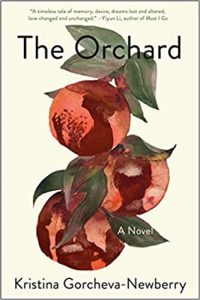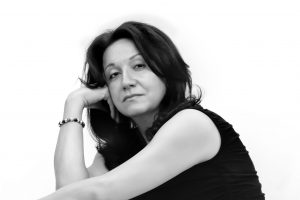Authors Interviewing Characters: KRISTINA GORCHEVA-NEWBERRY IN CONVERSATION WITH ANYA RANEVA: THE ORCHARD
KRISTINA GORCHEVA-NEWBERRY IN CONVERSATION WITH ANYA RANEVA: THE ORCHARD, Author/Character Interview
About THE ORCHARD
 Four teenagers grow inseparable in the last days of the Soviet Union—but not all of them will live to see the new world arrive in this powerful debut novel, loosely based on Anton Chekhov’s The Cherry Orchard.
Four teenagers grow inseparable in the last days of the Soviet Union—but not all of them will live to see the new world arrive in this powerful debut novel, loosely based on Anton Chekhov’s The Cherry Orchard.
“Spectacular . . . intensely evocative and gorgeously written . . . will fill readers’ eyes with tears and wonder.”—Minneapolis Star Tribune
Coming of age in the USSR in the 1980s, best friends Anya and Milka try to envision a free and joyful future for themselves. They spend their summers at Anya’s dacha just outside of Moscow, lazing in the apple orchard, listening to Queen songs, and fantasizing about trips abroad and the lives of American teenagers. Meanwhile, Anya’s parents talk about World War II, the Blockade, and the hardships they have endured.
By the time Anya and Milka are fifteen, the Soviet Empire is on the verge of collapse. They pair up with classmates Trifonov and Lopatin, and the four friends share secrets and desires, argue about history and politics, and discuss forbidden books. But the world is changing, and the fleeting time they have together is cut short by a sudden tragedy.
Years later, Anya returns to Russia from America, where she has chosen a different kind of life, far from her family and childhood friends. When she meets Lopatin again, he is a smug businessman who wants to buy her parents’ dacha and cut down the apple orchard. Haunted by the ghosts of her youth, Anya comes to the stark realization that memory does not fade or disappear; rather, it moves us across time, connecting our past to our future, joys to sorrows.
Inspired by Anton Chekhov’s The Cherry Orchard, Kristina Gorcheva-Newberry’s The Orchard powerfully captures the lives of four Soviet teenagers who are about to lose their country and one another, and who struggle to survive, to save their friendship, to recover all that has been lost.
KRISTINA GORCHEVA-NEWBERRY IN CONVERSATION WITH ANYA RANEVA
In Anya’s living room, I sit on the couch while Anya is in her leather chair, next to a petite coffee table protected by a glass top. She wears jeans and a faded green T-shirt that says Hearts Aren’t for Sale. She’s tall, thin, with a weary yet kind face. It’s a face touched by sadness, not defeat. She seems youthful, despite her graying hair and slim hands mapped with veins. The room is spacious and bright, with three windows, a fireplace, and floor-to-ceiling bookshelves, displaying photos and knickknacks: an amber brooch, a blue gzhel vase and a matching candleholder, four heart-shaped pebbles. I notice a small round aquarium on one of the end tables. Two red-speckled fishes navigate between the tall wavering weeds. Anya pours tea in old, fragile cups of pink and yellow roses over white porcelain, placing them back on the saucers. They make a gentle ringing sound, similar to that of a wall clock chimes. The teacups have sculptured edges like pleats of a skirt. A crystal bowl is filled with Soviet-style chocolate candy, and my eyes isolate the familiar shapes wrapped in colorful foils.
AR: Try one. Tastes like home. I buy them at a local international market. Black bread, too. And sprats. The rest isn’t much.
KGN: You should come to Brighton. They have everything. More than everything. Talk about Soviet nostalgia.
AR: You live there?
KGN: Not exactly. But I go for food. And the ocean.
AR: Jealous. My friends and I, back in high school, took a trip to the Black Sea. We went swimming naked, at night.
KGN: I did it once too, with my first boyfriend. The water was so cold, we nearly drowned.
AR: Should’ve had sex first.
She laughs, and so do I. She twists her hair in a loose pony tail while I unwrap a dome-shape candy and push it between my lips, the taste of home in my mouth. We both turn to look at the mountains, tall and mighty, stone warriors dressed in green armor.
KGN: Thank you for welcoming me into your lovely Virginia home. I understand that your husband built it?
AR: Rebuilt it. It’s a hundred years old.
KGN: I appreciated your story in the paper. I want to ask a few more questions. Purely research.
AR: So you can turn me into one of your characters?
KGN: I’ll fictionalize. It’ll be me posing as you. Or rather you poising as me. Your life in the Soviet Union, it’s so similar to mine. We’re close in age. I, too, lived in Moscow during perestroika and lost a friend. Or rather she disappeared.
AR: What happened?
KGN: I don’t know. But there were all those rumors. The grief was overbearing.
AR: Before I found out what happened to Milka, I tried to jump off the balcony in my Moscow flat, but my grandmother stopped me. Somehow, she could see, even though she was already blind.
KGN: They always know, the grandmothers. Clairvoyants. Mine was. She used to guess my birthday wishes.
AR: Mine told stories. The best of gifts. Milka thought that hugging her was like hugging a beloved book, breathing secrets from its pages.
KGN: You still miss your friend?
AR: Don’t you?
KGN: It was such a long time ago, I don’t even remember what she looked like, except for her mouth—full, red, always chewing.
AR: Yeah, Milka was like that, too—she ate and ate. And when she didn’t, she chewed on her lips. They were always chapped, especially in the winter, especially when it snowed.
KGN: It doesn’t snow much in Virginia, does it?
AR: It snows in the mountains. Heavy. And then it seems as though the sky has descended upon the earth like heaven upon hell.
KGN: What are you reading these days?
AR: Shakespeare. Chekhov. Plays mostly.
KGN: You still find them relevant?
AR: I find them heartbreaking. And what good is a story if it doesn’t hurt?
KGN: You should read Morrison. The Bluest Eye or Beloved. I die each time I read her work.
AR: Doesn’t that make you want to stop writing? You can never imitate.
KGN: Life is impossible to imitate, but that doesn’t mean I want to stop living.
AR: (laughing, gently): True. Something that Milka would’ve said. (Pauses, sips her tea.) My students asked me the other day why Russian literature is so tragic, why every hero dies or is about to.
KGN: What did you say?
AR: Read Shakespeare—Hamlet. It’s all in there: murder, death, endless misery. And we’re all willing participants.
She refills our cups. The tea is too black and tastes like burned wood. She sets the empty brewing kettle on the rug, then does the same with her cup and the candy bowl. Only now do I notice a few pieces of stained, yellowed paper displayed under the glass. The handwriting is small, sharp, and very precise; the blue ink has faded considerably. It looks like a play: stage setting, capitalized names, scattered bits of dialogue.
KGN: What’s that?
AR: The Cherry Orchard. The original pages. My mother brought them over a few summers back.
KGN: Are you serious?
AR: We performed the play in our senior year, along with Hamlet. My first boyfriend claimed that he’d inherited those pages from his great uncle. Milka’s boyfriend stole them when we were on a school trip to Chekhov’s house-museum. Everyone got so upset. We fought. It’s a long story.
KGN: Tell me.
Anya nods and gets up. Walking up to one of the bookshelves, she picks up a childhood photo in a simple wooden frame and passes it to me. The girl in the picture has a broad face, pulpy lips, and small acorn-brown eyes set too far apart and slanted. Her hair is straight and silky, cut in a neat bob around her jaw.
AR (back in her chair): Milka Putova and I had been friends since the first grade, which was pretty much for as long as I could remember. She was short and thin as a sprat, and every boy in our class called her exactly that—Sprat….
BUY THE ORCHARD HERE
 A Russian-Armenian émigré, Kristina Gorcheva-Newberry moved to the U.S. in 1995, after having witnessed perestroika and the fall of the Iron Curtain. Writing in English, her second language, she published fifty stories and received nine Pushcart nominations. Her work appeared in Subtropics, Zoetrope: All Story, Joyland, Electric Literature, Indiana Review, The Southern Review, Gulf Coast, TriQuarterly, Prairie Schooner, Nimrod, Confrontatio
A Russian-Armenian émigré, Kristina Gorcheva-Newberry moved to the U.S. in 1995, after having witnessed perestroika and the fall of the Iron Curtain. Writing in English, her second language, she published fifty stories and received nine Pushcart nominations. Her work appeared in Subtropics, Zoetrope: All Story, Joyland, Electric Literature, Indiana Review, The Southern Review, Gulf Coast, TriQuarterly, Prairie Schooner, Nimrod, ConfrontatioCategory: Interviews, On Writing
























